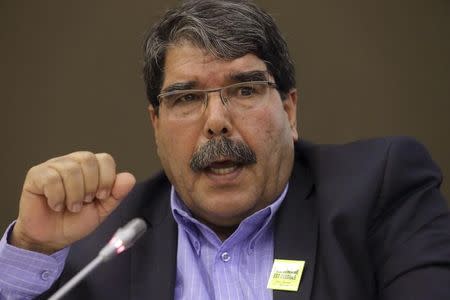Syrian Kurds say must be represented at Geneva talks

By John Irish PARIS (Reuters) - Syrian Kurds must be represented at peace talks in Geneva or they will fail, a Syrian Kurdish leader said on Friday. Saleh Muslim, co-chair of the Kurdish Democratic Union Party (PYD), also said one of the opposition groups involved, Jaysh al-Islam, had the "same mentality" as al Qaeda and Islamic State. The negotiations, due to begin on Jan. 25 in Geneva, look increasingly uncertain for reasons including a dispute over the composition of the opposition delegation. "If there are some parties that are effective in this Syria issue who are not at the table, it will be the same as what happened in Geneva 2," Muslim told Reuters, referring to failed negotiations in 2014. "The negotiations and political solution will fail so we are keen to have everyone at the table." Russia wants the opposition negotiating team expanded to include other figures that could be deemed closer to its own thinking as well as the main Syrian Kurdish party, the PYD, and the affiliated YPG militia. The YPG has meanwhile established close ties with the United States and is an important partner in the fight it is leading against Islamic State militants in Syria. The Saudi-backed opposition council has said it will boycott the Geneva negotiations if Russia insists on such a shake-up. Its chief negotiator Mohamad Alloush said on Thursday the PYD's "natural place" was with the government delegation and the opposition has accused the Kurds of fighting rebel groups. Muslim dismissed those suggestions as propaganda, saying Kurdish groups were not cooperating with the Syrian government and were defending themselves against groups that one day were affiliated to radical Islamists and another day calling themselves moderates. 'NOT ACCEPTABLE' When asked whether the Riyadh opposition platform set up in December was a step forward compared to previous opposition delegations, Muslim took aim at Alloush's Jaysh al-Islam group, which Russia has called a terrorist group. "Their mentality is the same as the Nusra Front and Daesh. They clearly want to establish an Islamic state," he said. "The Riyadh platform is accepting to establish an Islamic caliphate. It's not acceptable." In an interview in May last year, the late leader of Jaysh al-Islam, Zahran Alloush, backed away from previous hardline rhetoric, saying the Syrian people would be free to choose the type of state they want and calling Alawites - President Bashar al-Assad's minority sect - part of the Syrian people. A French diplomatic source said it was clear that at the end of the process the PYD and its affiliates would have to be associated to a definitive accord, but in the short-term it would be problematic. "We can't risk exploding the (Riyadh) opposition platform. The opposition considers that the PYD is not opposed to the regime and has no place being on its side of the table," the source said. "They have set parameters for talks and the first is that Bashar al-Assad goes. As far as I can tell that's not the PYD's position." The YPG militia has seized swathes of Syria from Islamic State with the help of U.S.-led strikes. The Syrian Kurds have declared an autonomous administration across parts of northern Syria along the Turkish border, rankling Ankara, which has fought a decades-long insurgency against Kurdish PKK separatists. "I don't know what will happen, but we are very keen to stop the bloodshed," he said. "I think this is the beginning of the political solution. It will take time." (Reporting By John Irish; Editing by Janet Lawrence)

